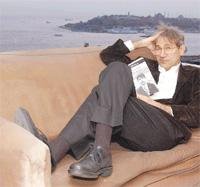
ďI write because I have an innate need to write. I write because I canít do normal work as other people do. I write because I want to read books like the ones I write. I write because I am angry at everyone. I write because I love sitting in a room all day writing. I write because I can partake of real life only by changing it. I write because I want others, the whole world, to know what sort of life we lived, and continue to live, in Istanbul, in Turkey. I write because I love the smell of paper, pen and ink. I write because I believe in literature, in the art of the novel, more than I believe in anything else. I write because it is a habit, a passion. I write because I am afraid of being forgotten. I write because I like the glory and interest that writing brings. I write to be alone. Perhaps I write because I hope to understand why I am so very, very angry at everyone. I write because I like to be read. I write because once I have begun a novel, an essay, a page I want to finish it. I write because everyone expects me to write. I write because I have a childish belief in the immortality of libraries, and in the way my books sit on the shelf. I write because it is exciting to turn all lifeís beauties and riches into words. I write not to tell a story but to compose a story. I write because I wish to escape from the foreboding that there is a place I must go but Ė as in a dream Ė canít quite get to. I write because I have never managed to be happy. I write to be happy.Ē
Orhan Pamuk, The Nobel Lecture, 2006, translated from the Turkish by Maureen Freely.This excerpt from Pamukís Nobel Lecture was in a recent
New Yorker issue. Iíve long envied writers the existence
of New Yorker and a few other periodicals, in which a wide public audience has an opportunity to contemplate the artistic and professional musings of some of the most interesting practitioners of their craft. I wished there could be a public forum in which composers would regularly share their deepest convictions, experiences and hopes with such honesty and self-awareness. Can you imagine
New Yorker publishing a speech by a major composer? I canít.
Thatís why I welcomed the arrival of blogs a few years ago, quickly developing an addiction to
Kyle Gannís, in which someone was finally opening a window to the composerís daily world Ė the aspirations and frustrations of devoting a life to putting notes together.
Kyleís blog is more successful than most, because in addition to his composing, he is also a very persuasive writer. But one thing that dissatisfies me about his blog is his skill as a critic and teacher. Not that there is anything wrong with being a critic or teacher Ė Iím a teacher myself -- itís just that critics and teachers have always written about music, and composers have far less frequently written about composing. (Kyle, if you are reading, thatís not a criticism, itís a compliment)
The obvious reason for this disparity is the relative level of difficulty. Itís much easier (though far from easy) to write about a piece of music than it is to write about composing. When describing compositional processes, we often fall back on inscrutable technical terminology because itís difficult to put anything else we do into words.
I got into blogging with the hope that I would be able to find a way to write about what it is we do. After two years, I canít say Iím at all satisfied with my results so far. But Iím going to keep plugging away at it, because there is an enormous gap in the publicís knowledge when it comes to composition, and I think this kind of discussion could be a very helpful bridge.
Of course, Iíd feel a whole lot better about it if I could write with half the clarity and ferocity of Mr. Pamuk.



